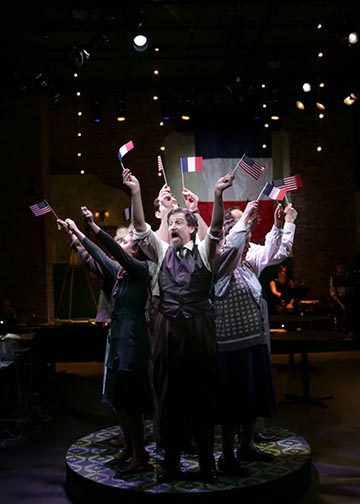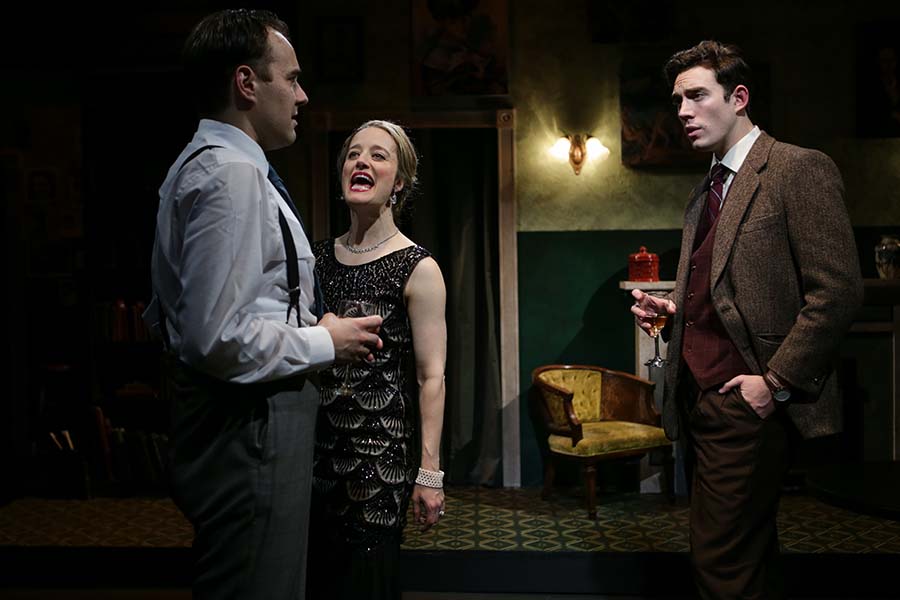In February, just as Book-It Repertory Theatre’s stage adaptation of A Moveable Feast was premiering in Seattle where it runs Feb. 9-April 2, America’s new leader Donald J. Trump insulted Paris.
The recently installed U.S. President recounted in an interview how a friend named Jim was a frequent and ardent visitor to the French capitol, but hasn’t returned since the deadly 2015 terrorist attacks there. Why? According to Trump, because “Paris isn’t Paris anymore.”
While Paris remains fascinating and inviting, there was a grain of truth in that remark. The Paris of American lore and fantasy, evoked in countless romantic songs, films (from Woman of Paris to An American in Paris to Midnight in Paris) and in countless works of literature, can still be found in certain streets and quartiers, in certain timeless cafes, in the Tuileries and other sylvan parks where lovers still stroll arm in arm. But since the modern era our collectively mythologized Paris is also an apparition, a wish, a touristic fantasy—especially for Americans.
Nostalgia for that City of Lights continues on, however, on both sides of the Atlantic. Consider the Seattle box office success of A Moveable Feast, a culinary and cultural homage to Hemingway’s Paris sojourn during the 1920s. The latest of Book-It Rep’s adaptations of literary classics is enjoying a sold-out run at Café Nordo’s Culinarium.
“If you are lucky enough to have lived in Paris as a young man, then wherever you go for the rest of your life, it stays with you, for Paris is a moveable feast,” Hemingway wrote. Accompanied by a combo performing Jazz Age tunes and a multi-course French dinner served by a versatile, hard-working cast, the production aims to conjure the milieu and esprit, the je ne sais quoi, of the feast celebrated by a young expat writer who found sanctuary and literary inspiration in bohemian Paris between the wars.
Performed on mini-sets tucked into corners of Café Nordo’s Culinarium (a cozy Pioneer Square combination of theatre and boite), the production comes across as a kind of affectionate cabaret show, alternately wistful and boisterous, acerbic and lyrical. The first-person narration, lifted directly from the memoir, has the Chicago-born author and member of the literary Lost Generation observing and mingling with fellow American scribes of the period, mainly novelist and salon-hostess Gertrude Stein, novelist F. Scott Fitzgerald, and the poet Ezra Pound.
The less a patron knows about the actual people depicted, perhaps the better. Hemingway suggests in the preface to his episodic book, written several decades after the events it describes, “If the reader prefers, [it] may be regarded as fiction. But there is always the chance that such a book of fiction may throw some light on what has been written as fact.” And in a program note to his Book-It adaptation, co-conceiver and adaptor Judd Parkin makes no apologies for any of the text’s exaggerations and distortions. “The inaccuracies and outright lies of Hemingway’s memoir are well-documented,” he acknowledges, “but that doesn’t undermine the power of the book, and its overriding theme that work and art can provide a form of deliverance.”

Hemingway’s impressions (drawn and revised, in the 1950s, from his journals of the early ‘20s) are that of an ambitious, cocky, young writer living cash-strapped but happily with his new wife Hadley Richardson in a tiny Montparnasse apartment above a sawmill on the Rue Cardinale Lemoine. The slender volume (published in 1964, two years after the writer’s death) is filled with homages to long-lost cafes he loved, fishermen he observed along the Seine, and portraits of the heady arts scene that attracted him and many fellow American artists to a cheaper, more welcoming, and socially tolerant metropolis than his home country could provide after the devastating World War I, in which Hemingway fought and was wounded.
Today, Hemingway’s reputation is diminished by a self-consciously terse writing style and a glaring machismo in his image and work which are, largely and thankfully, no longer de rigueur in our popular literature. But A Moveable Feast is in a category of its own: It still delights those who haven’t read much of his other work (apart from, say, The Old Man and the Sea, a staple of high school English courses). And since those deadly 2015 terrorist attacks in the heart of Paris, sales of the memoir’s French translation have surged among Parisians who regard the book as an affirmation of their cherished city.
No, you don’t have to buy into all of Hemingway’s “he-man stuff,” as one feminist critic put it, to find A Moveable Feast delectable. It isn’t so much an exploration of masculinity, as a reverie about the art and practice of writing, the pleasures of eating and drinking, about a flâneur (stroller) in a city of simple pleasures, about hunger and first love.
But like some French liqueurs that go down sweetly but pack a punch, this is also a gossipy, sometimes nasty portrait of fellow U.S. expats in Paris whom Hemingway loved (Pound and the kind-hearted Paris book-lender and bookseller Sylvia Beach), loathed (novelist Ford Maddox Ford) or felt deeply ambivalent about (Fitzgerald and Stein).
Judd Parkin and director Jane Jones, who co-conceived the show, could hardly fit every persona, proclamation and anecdote in A Moveable Feast into a three-hour piece with meal breaks. So they’ve created their own pastiche of the writer’s observations of Paris and encounters with fellow literary lions.
Should it matter that Hemingway’s take-down of Stein, among others, is softened by Riley Shanahan’s earnestly likable portrayal of him? Or that the author’s amusing depiction of Fitzgerald (Andre Nelson) is tainted by cruelty?
The vignette of a trip Hemingway and Scott took together to Toulouse (“Never travel with someone you do not love”) is played out as a laughable comedy of errors. And while Hemingway’s respect for his companion’s writing is voiced, so is his disdain for Fitzgerald’s inability to hold his liquor, his fussy hypochondria, and his attachment to his tragically unstable wife Zelda Fitzgerald (Jen Taylor), whom Hemingway writes off as jealous and emasculating. (Actually, Zelda got some of her own back by declaring that his breakthrough 1920s novel The Sun Also Rises is about “bullfighting, bullslinging, and bullshit.”)
There are more signs of the misogyny that has diminished Hemingway’s standing among readers and critics since the 1970s. Most damning in the show, but more so in the book, is his homophobic reaction of disgust to an intimate, sexually-tinged argument he supposedly overheard between Stein and her life partner Alice B. Toklas.
But Book-It’s Moveable Feast focuses more often on lighter-hearted exchanges with the imperious Stein (Susanna Burney) over tea, appreciations of la vie en Paris, and tender moments with the supportive Hadley, the first of Hemingway’s four wives—and the one he most regretted losing (due to his affair with one of her best friends).
So does it matter that in this adaptation, Hadley, who at 30 was eight years older than Ernest when they came to France in 1921, is played by a more girlishly youthful actor (Harriette Dunn-Feliz)? Or that we’re never informed that Hadley subsidized Hemingway’s career switch from journalism to fiction with her modest family inheritance? (To be fair, he signed The Sun Also Rises royalties over to her.)
And what of the gushing admiration for Pound (Raymond Chapman), without mention of the poet’s virulent defense of fascism during the 1930s and ‘40s? (In a letter to poet-playwright Archibald MacLeish, Hemingway called Pound’s views a “disgrace,” and considered them an act of insanity.)

Indeed, does it matter that the adaptation does not view this “charmed” milieu in a wider historical context? And is it important that the role-switching cast members sometimes barely resemble the actual people they are based on—in an adaptation of a memoir that does not promise fidelity to fact, and was edited by someone with her own agenda (the memoirist’s widow, Mary Hemingway)?
Such questions confront anyone penning drama based on the lives of well-known figures. Book-It has chosen to select and enact Hemingway’s own version of events in his own words, evoking one radiant filament of time, and serving audiences a nostalgic entertainment accompanied by, among other potables, a bowl of luscious potato leek and laurel soup from The Alice B. Toklas Cookbook.
I’m of two minds about this approach: It doesn’t offer enough insight or irony vis à vis Hemingway. And It doesn’t look ahead or backward, to convey a broader understanding of influential forces and gender politics in 20th-century American modernist literature.
For that, the field is open to other dramatists. Book-It’s Moveable Feast program does include factual mini-bios of the characters, which may spur audiences to investigate (and ponder) further. At the top of my reading recommended list would be: Charmed Circle: Gertrude Stein and Company by James Mellow, Nancy Mitford’s feminist biography Zelda, Paula McLain’s beautiful recent novel The Paris Wife, Sylvia Beach’s memoir Shakespeare and Company, and Hemingway: The Paris Years by Michael Reynolds, as well as the fiction of Hemingway, Stein, Fitzgerald, and contemporaries.
What the production does provide, however, is a diversion and relief from the wrenching and divisive tenor of the current American sociocultural climate, a time-travel respite back to a place in time and space where art and artists mattered, creativity was nurtured and flourished, where life’s basic pleasures were easily attained and savored.
What is most seductive in Book-It’s Moveable Feast, in addition to a good wine list and a dessert of Josephine Baker Custard, is what in the film Casablanca Bogie fondly tells Ingrid Bergman: “We’ll always have Paris.” Maybe because we’ll always need it.


